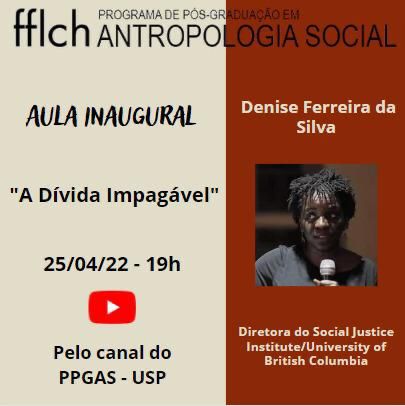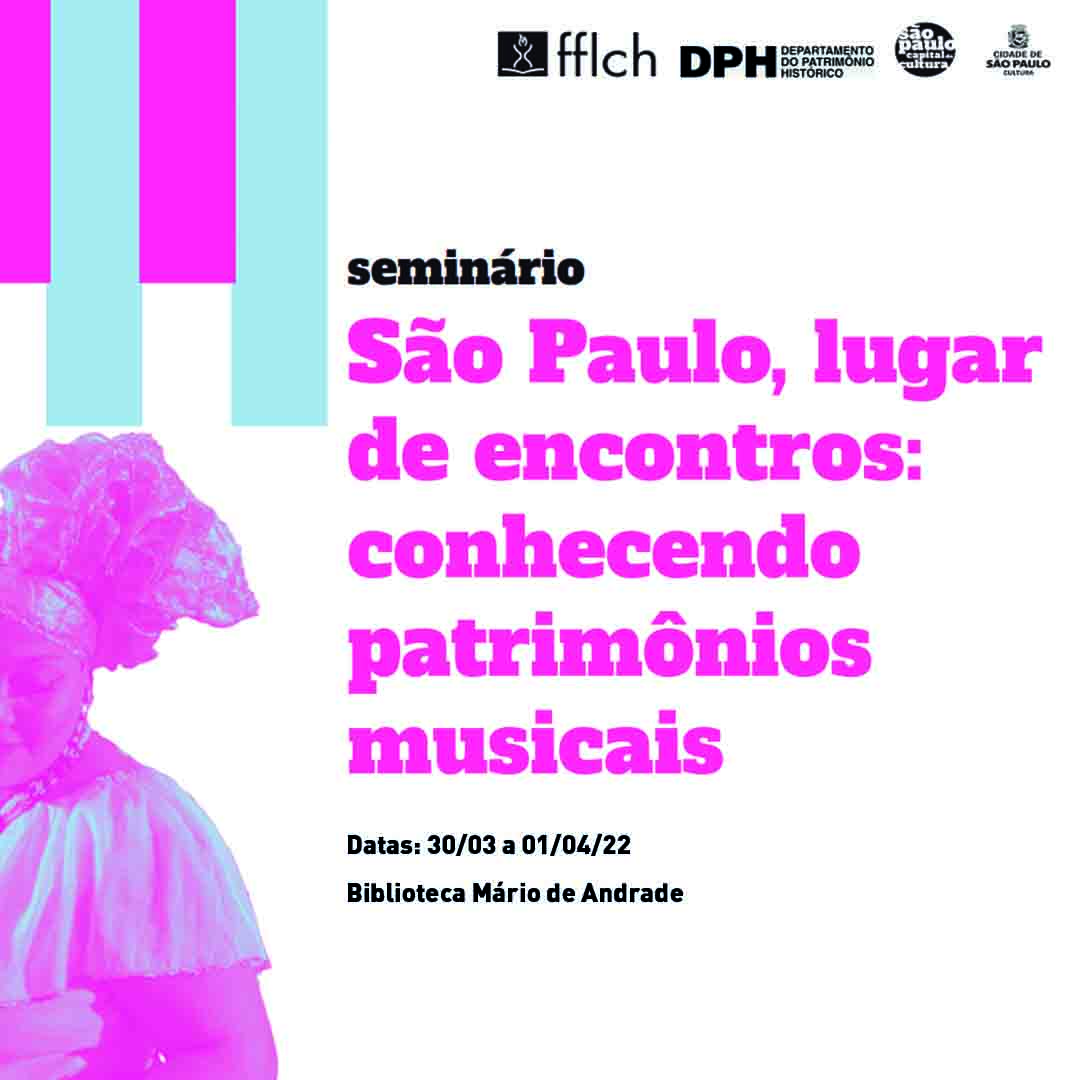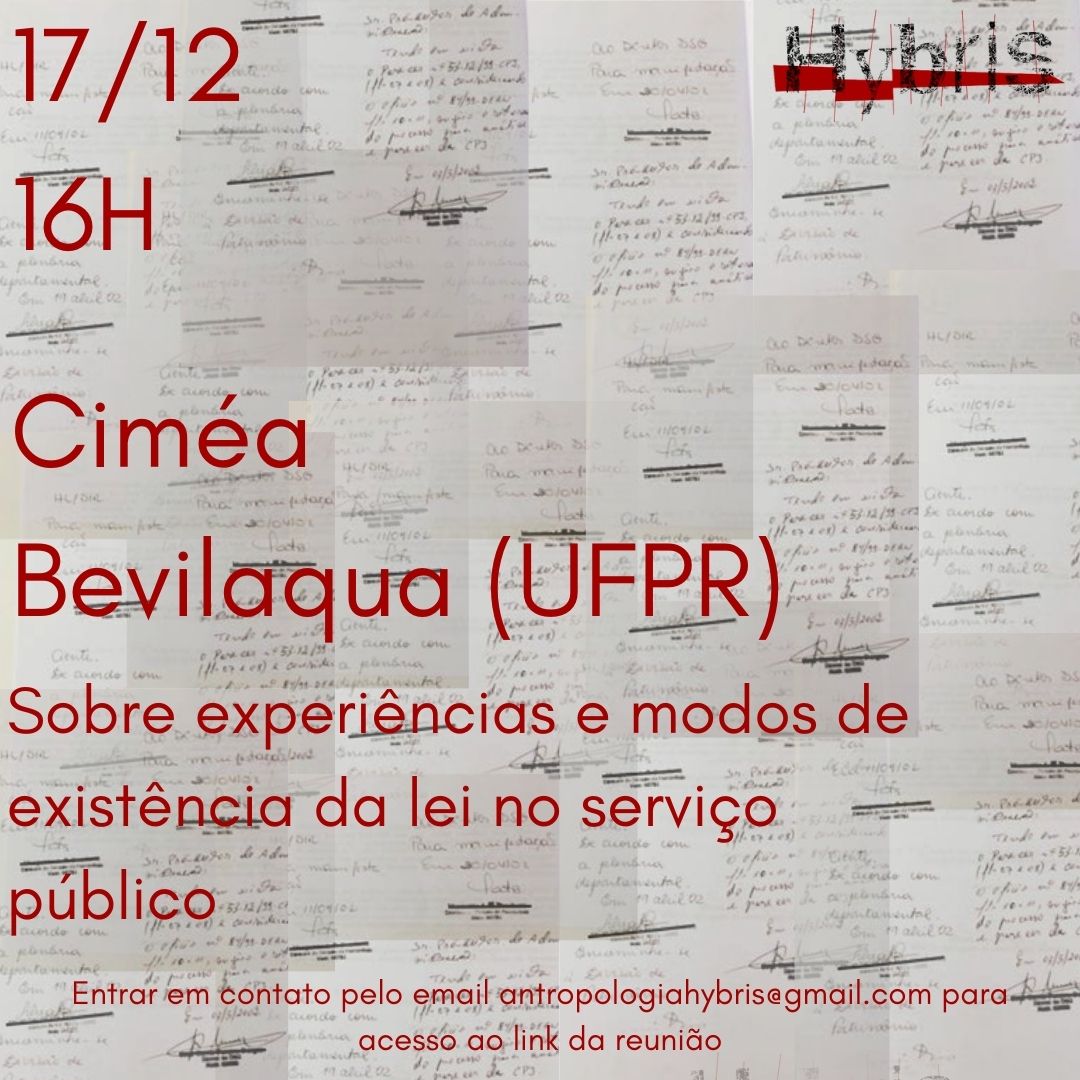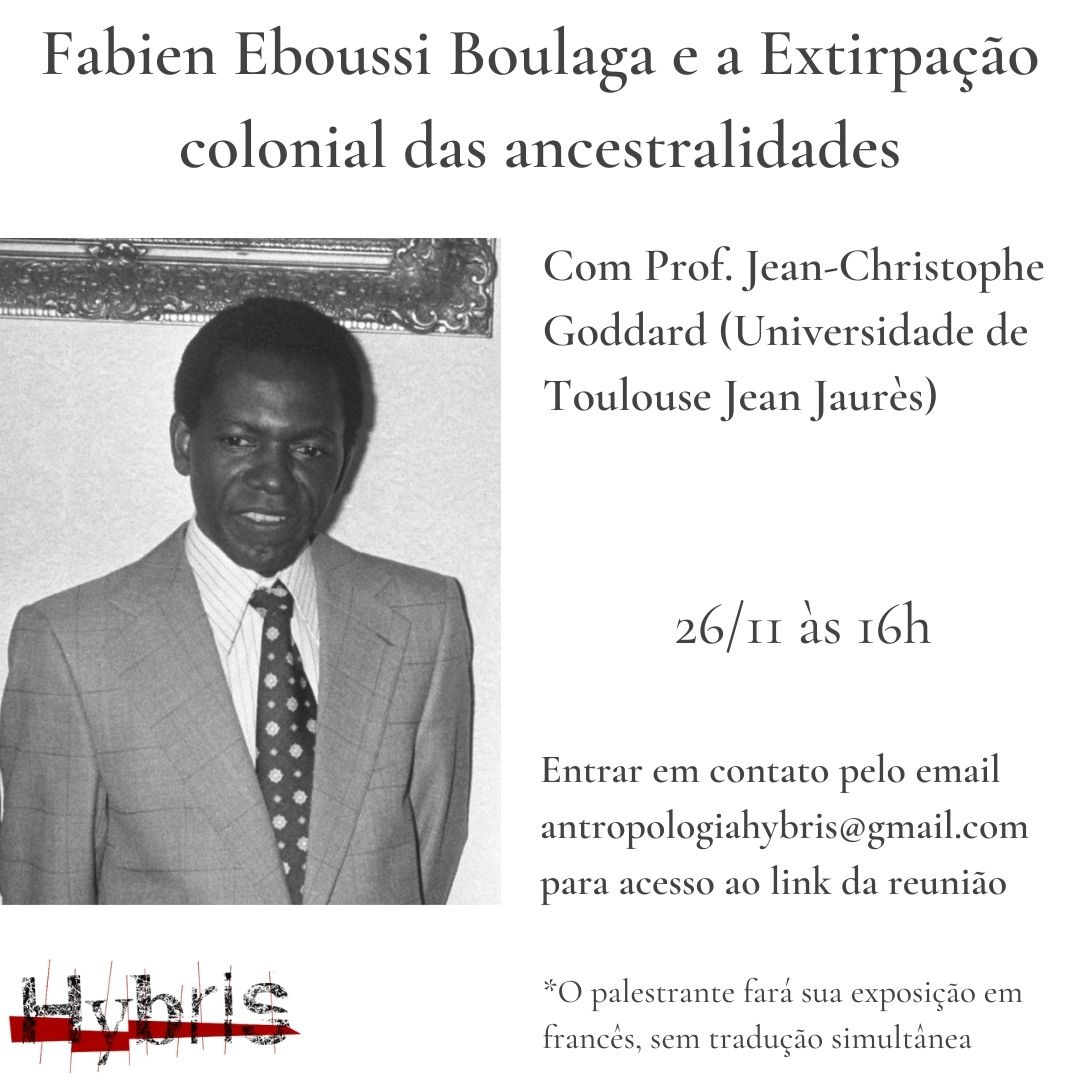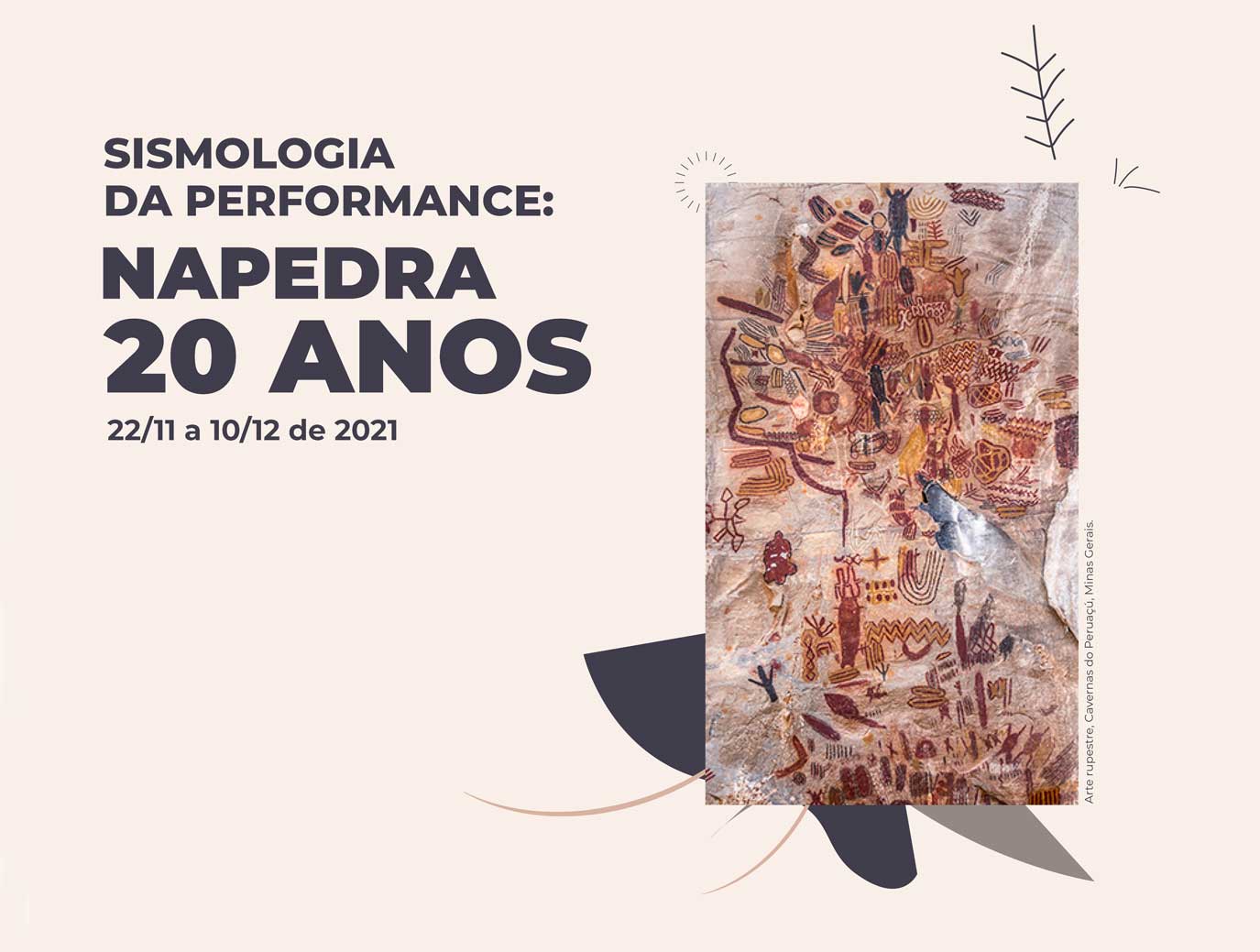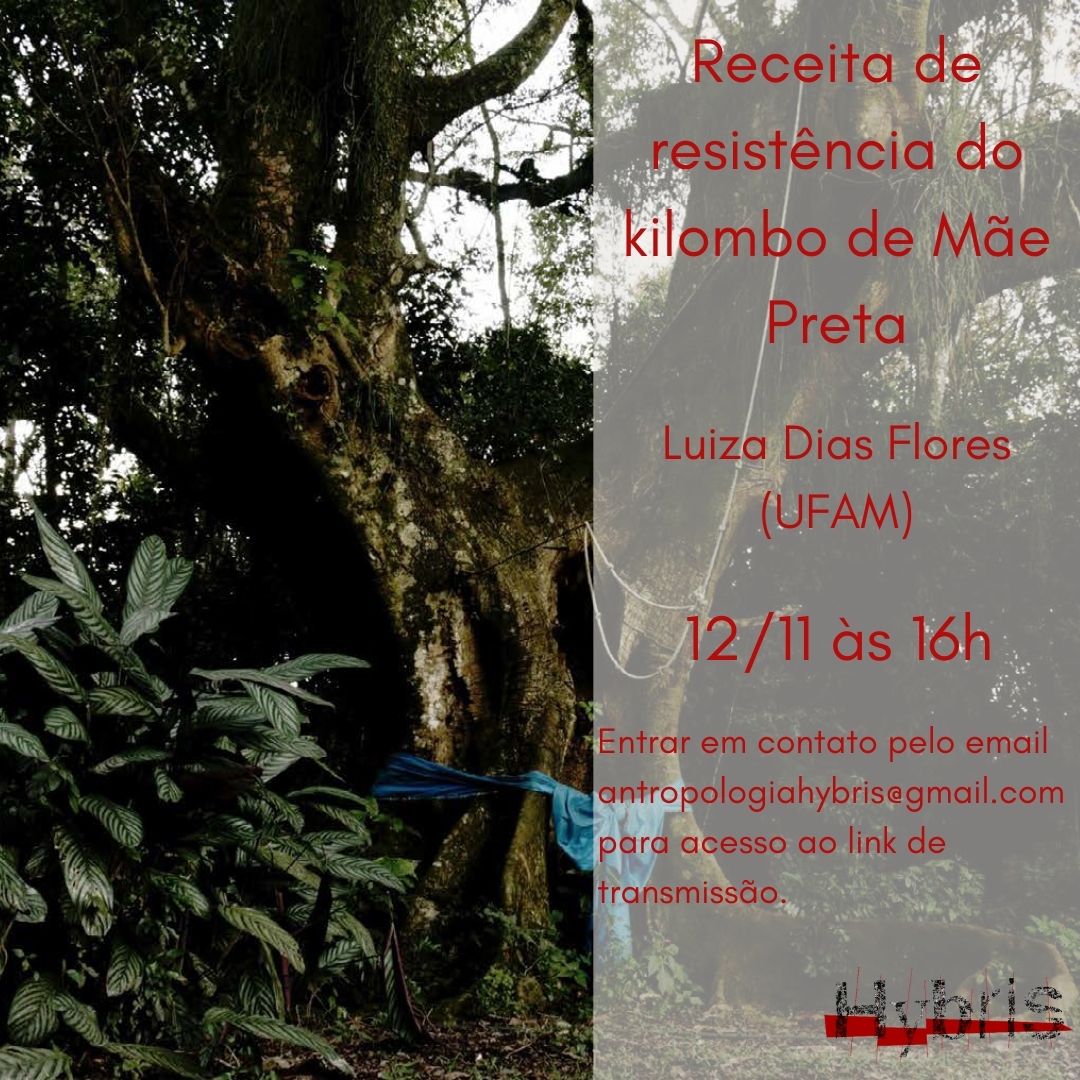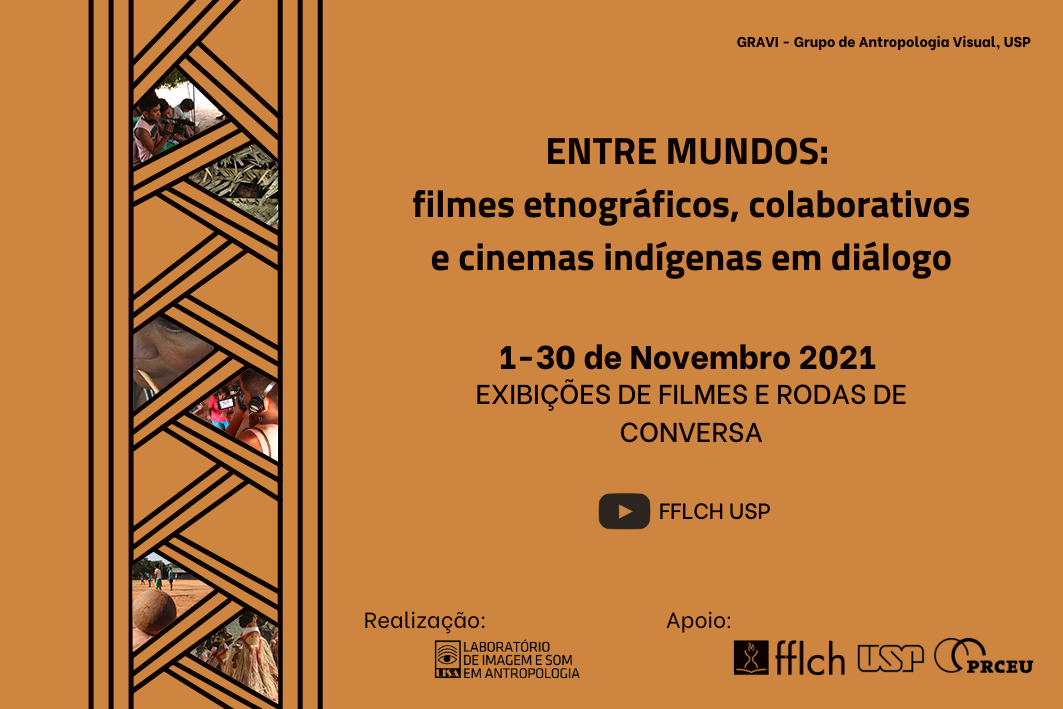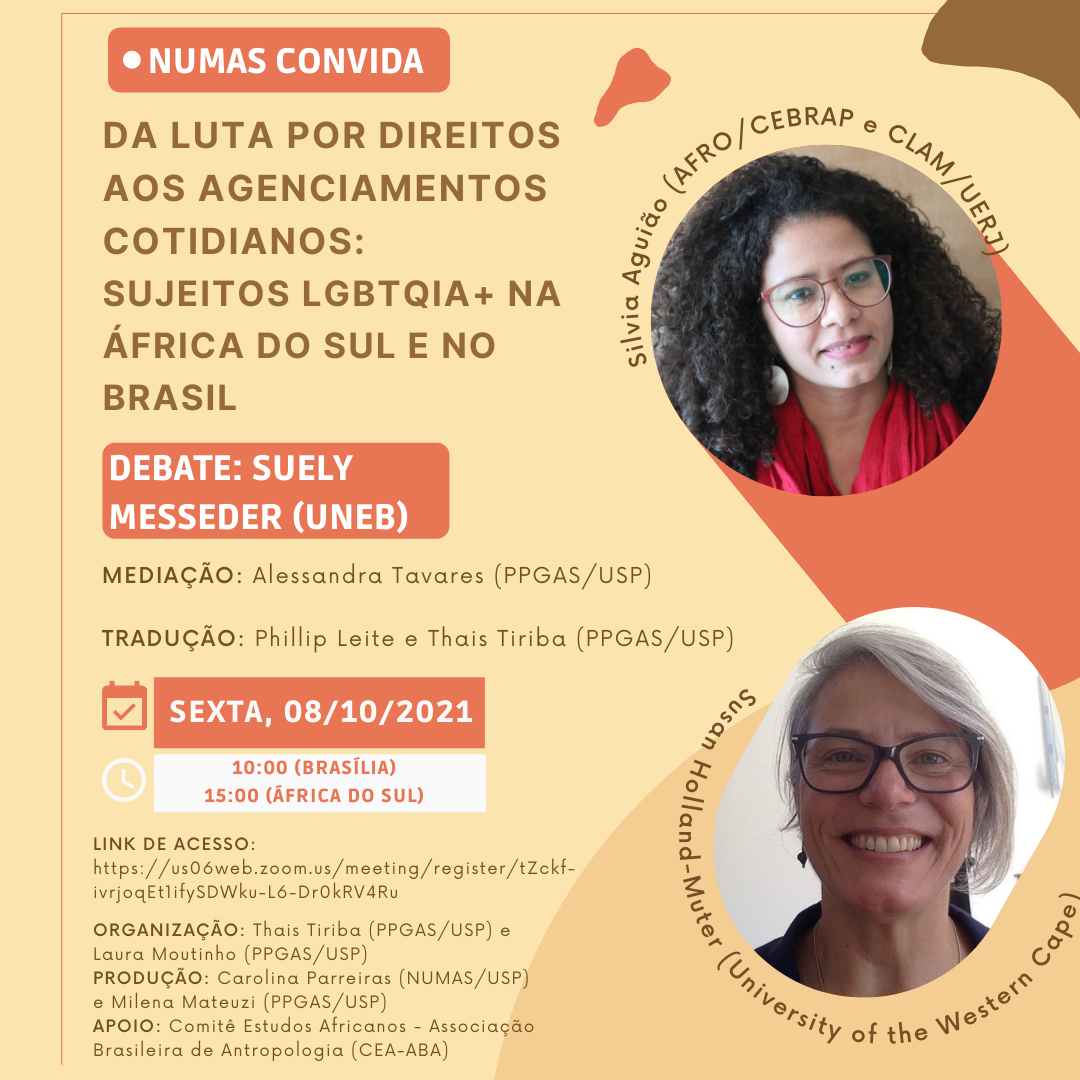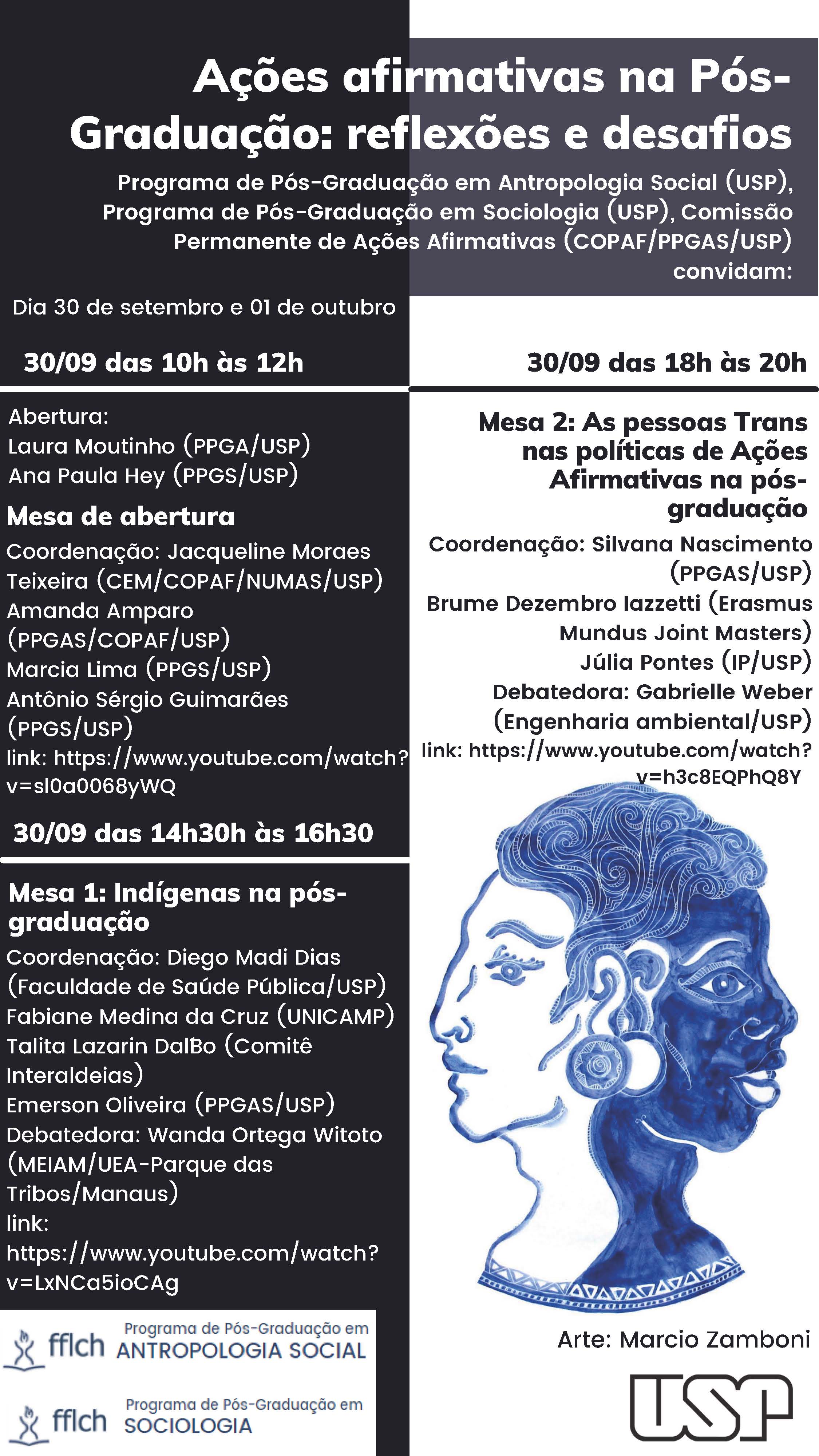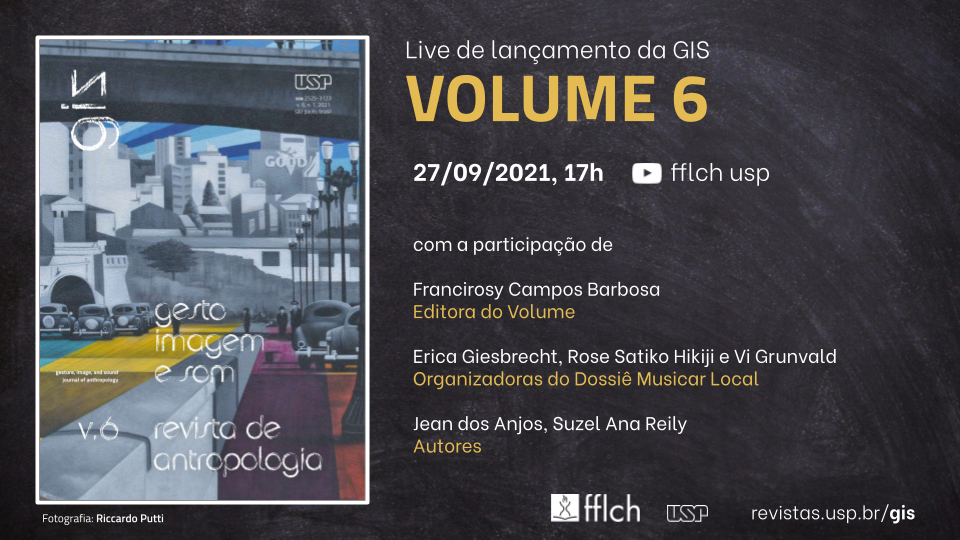Events
PPGAS/USP invites everyone to attend the inaugural class of the semester "A Debt Unpayable" with Denise Ferreira da Silva, Director of the Social Justice Institute/University of British Columbia, which will take place on April 25, 2022, at 19 pm, on the PPGAS / USP YouTube channel.
The opening will be held by Laura Moutinho (PPGAS/USP coordinator). The panel will be mediated by Alessandra Tavares (Periferia Segue Sangrando/PPGAS-USP) and Léa Tosold (GIRA-USP/SCRIPTS - Freie Universität Berlin).
Here are two reading instructions:
SILVA, Denise Ferreira da “Para uma Poética Negra Feminista: A Busca /Questão da Negridade Para o (Fim do) Mundo”. In: FERREIRA da SILVA, Denise - A Dívida Impagável, São Paulo: 2019.ISBN 978-85-7715-615-3 https://casadopovo.org.br/wp-
SILVA, Denise Ferreira da. “Reading art as confrontation,” e-flux journal, no.#65 SUPERCOMMUNITY, may-august 2015, http://supercommunity.e-flux.
Dates: 03/30 to 04/01/22 at the Mário de Andrade Library.
1st day - 03/30
17:00 - Opening Ceremony
Opening speech: Suzel Reily – Music local and heritage
17:30 – Registration Table
Renata Amaral - What I remember, I have – 30 years of the Maracá Collection
Luciana Rosa - Choro as a heritage: memories and records of São Paulo's choro
Isabel Santos - The role of holders in the official registration of their knowledge as
intangible heritage: the case of forró
Lorena Avellar de Muniagurria - commentator
2nd day - 03/31
17:30 – Transit Table
Kelwin Marques - Batucando-Singing-Dancing: a Congo Gold in the city of São
Paul (visual essay)
Mariana Teófilo - Bolivian immigration and its practices: putting music to the Altiplano in São
Paul
Rose Satiko Gitirana Hikiji - Inheritances and Inventions – music the African heritage in
Sao Paulo
Brisa Flow - Intervention
Klaus Wernet - commentator
3rd day - 01/04
17:30 – Table Stages
Mihai Andrei Leaha - Stages on the Street, spaces and images of the independent music scene
electronics of São Paulo (audiovisual essay)
Julio Stabelini - Novo Anhangabaú: skateboarding is worth the stage
Meno del Picchia - A musicar of the walls - sound borders of the ravine
Chapinha (Samba da Vela) – São Paulo, meeting place
Luis Henrique Toledo - commentator
8pm – Closing Ceremony
Show: Yannick Delass
Hybris event "On experiences and modes of existence of the law in public service", with Ciméa Bevilaqua (UFPR). December 17, at 4 pm. Contact antropologiahybris@gmail.com to access the meeting link.
with Prof. Jean-Christophe Goddard (University of Toulouse Jean Jaurès).
Contact us by email antropologiahybris@gmail.com to access the link.
*The speaker will speak in French, without simultaneous translation in Portuguese.
Via Zoom - bit.ly/napedra
On Youtube - https://www.youtube.com/channel/UCcmmeOVL_9x0NvUivBOf6Yg
In 2001, from the initiative of the participants of an optional subject at the PPGAS/USP, interested in exploring a series of issues beyond the disciplinary scope, Napedra was created. The subject was called Paradigms of Theater in Anthropology. We decided to deepen our studies in the interfaces of anthropology and performance, alternating studies of texts relevant to the anthropology of performance with experience in the field of performance events.
Coordinated by John C. Dawsey, Napedra arises from the meeting of anthropologists in search of knowledge produced in art workshops, with artists in search of knowledge associated with the anthropologists' craft. It is the first research center in anthropology and performance in Brazil.
Performance seismology. The Anthropology, Performance and Drama Nucleus (Napedra), whose acronym evokes a geological image, is born from the echoes of a seismological movement in the field of anthropology. It resonates with the sounds and noises of a “performative turn” in anthropology, which began in the 1970s, involving a significant number of researchers.
Between the arts and sciences, the concept of performance takes on varied, changing and hybrid forms. There is something unresolved in this concept that resists definitive formulations and disciplinary boundaries. From different fields of knowledge and artistic expression – theater, music, performing arts, anthropology, sociology, psychoanalysis, linguistics, decolonial studies, feminism, queer theory – the concept of performance is formulated.
Napedra has been a pioneer in performance studies in Brazilian anthropology. It organized events that mark the field of performance anthropology, such as the International Anthropology and Performance Meeting – EIAP (2011), the 1st National Anthropology and Performance Meeting – ENAP (2010), and the Meetings with Richard Schechner (2013). It proposed the first research forums and working groups in performance studies of the Brazilian Association of Anthropology (ABANNE 2003; RBA 2004, 2006, 2012) and the National Association of Postgraduate Studies and Research in Social Sciences (ANPOCS 2005, 2006, 2007) ). It organized research forums and working groups at the First Latin American Anthropology Congress (ALA 2005) and Mercosur Anthropology Meetings (RAM 2005, 2009). In 2009, he held the Colloquium of Napedra: Sounds, Noises and Poetics of Performance. From 2008 to 2013, she developed the thematic project Anthropology of Performance: Drama, Aesthetics and Ritual (Fapesp 06/53006-2), a period in which the participation of Regina Pólo Müller, as a principal researcher, stands out. The project resulted in 22 books, 81 articles, 82 book chapters, and 102 international presentations. It created links with NYU, Université Paris 8, EHESS, IUL-CRIA, UBA and other performance studies centers. He has published the collections Antropologia e performance: essays Napedra (Terceiro Nome, 2013), Anthropology and performance (dossier by Revista de Antropologia, 2013) and Seismology of performance: stages, time and f(r)icções (dossier from Revista Cultures-Kairós, 2016 ). From 2014 to 2020, he organized the events Napedra in performance: creations 1 to 11. And now, in 2021, Seismology of performance: Napedra 20 Years.
New groups and research programs were created by members of Napedra, contributing to the formation of a field. Highlights include the Nucleus of Anthropology of Law (NADIR), at USP, by Ana Lúcia Pastore Schritzmeyer; the Image and Performance Anthropology Nucleus (NAIP), at UNESP, by Edgar Teodoro da Cunha; the Ritual, Festa e Performance Group, at UFS, by Eufrázia Cristina Menezes Santos; the Anthropology Group in Islamic and Arab Contexts (GRACIAS), at USP, by Francirosy Campos Barbosa; the research group MOTIM – Mito, Rito e Cartografias Feministas nas Artes, at UERJ, by Luciana de Fátima Rocha Pereira de Lyra; the Terreiro Group of Scenic Investigations: Theater, Play, Rituals and Vadiagens, at UNESP-SP, by Marianna F. M. Monteiro; the group Poéticas do Corpo, at UnB, by Rita de Cássia de Almeida Castro; the Interdisciplinary Graduate Program in Cultural Performances at UFG, by Robson Corrêa de Camargo; the Research Group on Anthropology of Music (PAM), at USP, by Rose Satiko Gitirana Hikiji; and the Center for Studies on Performance, Heritage and Cultural Mediations (NEPPAMCs) at UFMG, by Rubens Alves da Silva.
In 1977, one of the gravitational centers, or whirlpools, of an emerging field dawned in the universe of anthropology. Victor Turner, an anthropologist in search of knowledge of the performance arts, meets Richard Schechner, a theater director who, in his relationship with Turner, becomes an apprentice of anthropology. In Napedra's experience, it is a point of light that serves as a reference for one of the constellations of performance studies. This, in an expanding and off-center universe.
New horizons open up. At Napedra, studies of films, images, narrative performances, bodies on stage, queer theory, necropolitics, feminist cartographies, drifting ethnographies, decolonial performances, American studies, Amerindian, anthropocene and Afrofuturism gain strength. Since its creation, the approach of researchers from Napedra to the thought of Walter Benjamin has drawn attention, rehearsing possible Benjaminian anthropologies. Also worthy of attention is the closeness of Napedra, since 2007, with the Núcleo de Artes Afro-Brasileiras and with Luiz Antonio Nascimento Cardoso, Mestre Pinguim, who, for more than two decades, works in one of the most significant spaces of performance and creation to know at USP.
Hybris event, with Luiza Dias Flores (PhD in Anthropology and professor of Anthropology at UFAM).
Contact us by email antropologiahybris@gmail.com to access the transmission link.
Celebrating 30 years of creation of the Laboratory of Image and Sound in Anthropology (LISA) of the Department of Anthropology of the University of São Paulo, during the month of November 2021 GRAVI - Visual Anthropology Group - organizes the event Between worlds: ethnographic, collaborative films and indigenous cinemas in dialogue.
The event consists of three meetings and an exhibition of films produced in the context of anthropological research with the support of LISA and different productions from South America , which express works done by, about and with indigenous peoples.
1. Circulations of Indigenous Cinemas, which brings together producers, directors and indigenous collectives that address the challenges that permeate indigenous films, especially in terms of their circulation;
2. Collaborative productions and processes, which highlights the different shared film makings within the scope of the training of indigenous filmmakers;
3. Ethnographic Films: research and training, which addresses film production about indigenous peoples carried out in the context of academic research with a focus on the relationship between the university and indigenous peoples.
Each program of the exhibition has a debate which includes directors and directors from indigenous groups, institutions and universities, as well as a GRAVI researcher who investigates related topics.
FILM EXHIBITION PROGRAM: Films will be open the 01/11/2021
Program 1 - Indigenous Cinema Circulations
Program 2 - Collaborative Productions and Processes
Program 3 - Ethnographic Films: research and training
ROUND TABLE PROGRAM
Opening: Paula Morgado (LISA/USP)
05/11/21, 17:00
Circulations of Indigenous Cinemas
Mediation: Ana Lúcia Ferraz (Anthropologist and director/GRAVI/USP)
- David Hernández Palmar (Director Wayuu, curator and coordinator of CLACPI – Latin American Coordinator of Cine y Comunicación de los Indígenas Publos)
- Patricia Yallico - (Ecuadorian Quechua Director – ACAPANA - Association of Film Creators and the Audiovisual of Pueblos y Nacionalidades)
- Alberto Alvares Tuparay (Guarani director, taking a master's degree in UFF cinema)
- Ivan Molina (Bolivian Quechua Director, Escuela de Cine y Artes Audiovisuales de La Paz)
11/12/21, 17:00
Collaborative Productions and Processes
Mediation: Nadja Marin (Anthropologist and filmmaker, GRAVI/USP)
- Iván Sanjinés (Filmmaker, CEFREC - Center for Training and Filmmaking/ Plurinational Comunicación Indígena Originario Campesino Intercultural)
- Mari Corrêa (Filmmaker, Instituto Catitu)
- Takumã Kuikuro (Director, Kuikuro Film Collective)
- Tipuici Manoki and André Lopes (PPGAS/USP and Coletivo Ijã Mytyli)
11/19/21, 17:00
Ethnographic Films: research and training
Mediation: Renato Sztutman (Anthropologist/USP)
- Ana Lúcia Ferraz (Anthropologist and director/UFF)
- Dominique Tilkin Gallois (Anthropologist/USP)
- Faye Ginsburg (Anthropologist/NYU)
- Mauricio José Godoy Paredes (Filmmaker/PUCP)
- Ruben Caixeta Queiroz (Anthropologist and director/UFMG)
Closing: Sylvia Caiuby Novaes (GRAVI and LISA Coordinator)
GUESTS
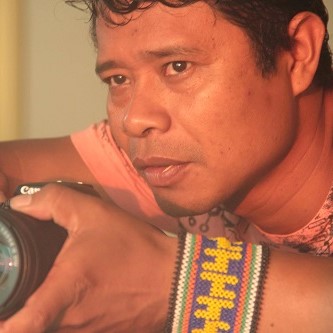 Alberto Alvares Tuparay is a Guarani filmmaker. He graduated in Intercultural Licentiate for Indigenous Educators, at the Faculty of Education of the Federal University of Minas Gerais and is currently and currently pursuing a master's degree in the Graduate Program in Cinema and Audiovisual at the Fluminense Federal University – PPGCINE. He works as an audiovisual teacher in training indigenous filmmakers in different projects. Directed the film "The Last Dream" (60 minutes, 2019), and the short film Ayvu Ypy – Origin of the Language (2020), among several others.
Alberto Alvares Tuparay is a Guarani filmmaker. He graduated in Intercultural Licentiate for Indigenous Educators, at the Faculty of Education of the Federal University of Minas Gerais and is currently and currently pursuing a master's degree in the Graduate Program in Cinema and Audiovisual at the Fluminense Federal University – PPGCINE. He works as an audiovisual teacher in training indigenous filmmakers in different projects. Directed the film "The Last Dream" (60 minutes, 2019), and the short film Ayvu Ypy – Origin of the Language (2020), among several others.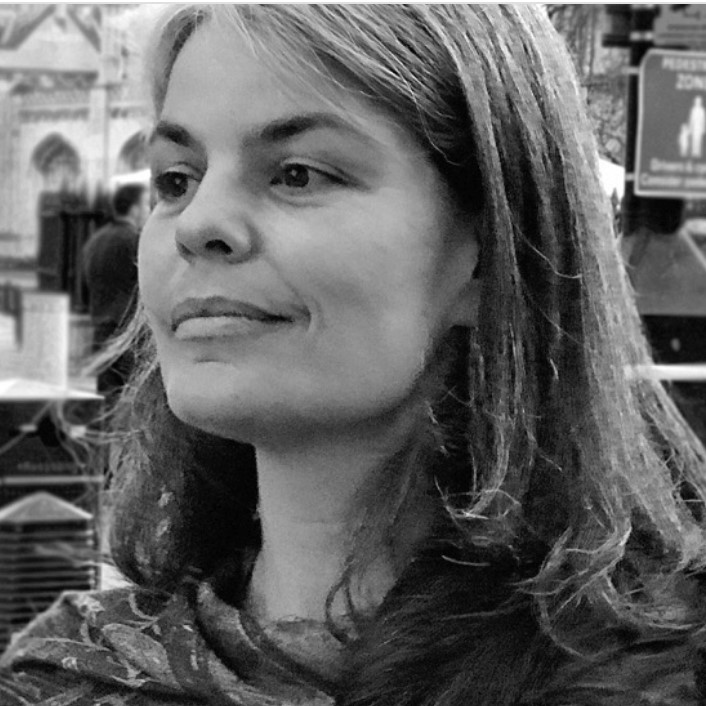 Ana Lúcia Ferraz is Professor at the Fluminense Federal University (UFF) and collaborates with the Masters in Visual Anthropology at FLACSO - Faculdade ;Latin American Social Sciences. Master in Anthropology (USP, 1998), PhD in Sociology (USP, 2005) and director of a series of ethnographic films. It currently operates in the fields of Visual Anthropology and Guarani Ethnology. Researcher at the Visual Anthropology Group (GRAVI/USP), Anthropology, Performance and Drama Nucleus (NAPEDRA/USP), Anthropology, Urban Rites and Sociabilities Nucleus (NARUA/UFF) and Cosmologies and Visuality (FLACSO).
Ana Lúcia Ferraz is Professor at the Fluminense Federal University (UFF) and collaborates with the Masters in Visual Anthropology at FLACSO - Faculdade ;Latin American Social Sciences. Master in Anthropology (USP, 1998), PhD in Sociology (USP, 2005) and director of a series of ethnographic films. It currently operates in the fields of Visual Anthropology and Guarani Ethnology. Researcher at the Visual Anthropology Group (GRAVI/USP), Anthropology, Performance and Drama Nucleus (NAPEDRA/USP), Anthropology, Urban Rites and Sociabilities Nucleus (NARUA/UFF) and Cosmologies and Visuality (FLACSO). André Lopes is a doctoral candidate in Social Anthropology at USP and has a master's degree from the same institution. Researches, works and lives with the Manoki and Myky peoples of Mato Grosso since 2008, acting as an anthropologist, documentarian and trainer of indigenous filmmakers. He is the co-founder of the Ijã Mytyli film collective Manoki and Myky and participated in the training of indigenous filmmakers among different peoples, such as Wayana, Aparai, Wajãpi, Tiryó and Guarani. In 2019 he was a visiting researcher at New York University and since then he has collaborated with international indigenous film institutions such as Wapikoni Mobile and Clacpi.
André Lopes is a doctoral candidate in Social Anthropology at USP and has a master's degree from the same institution. Researches, works and lives with the Manoki and Myky peoples of Mato Grosso since 2008, acting as an anthropologist, documentarian and trainer of indigenous filmmakers. He is the co-founder of the Ijã Mytyli film collective Manoki and Myky and participated in the training of indigenous filmmakers among different peoples, such as Wayana, Aparai, Wajãpi, Tiryó and Guarani. In 2019 he was a visiting researcher at New York University and since then he has collaborated with international indigenous film institutions such as Wapikoni Mobile and Clacpi.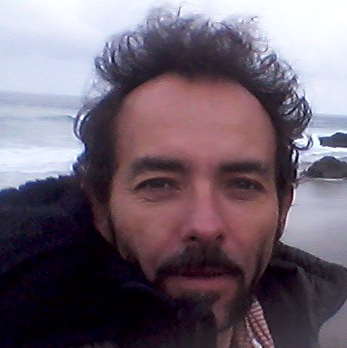 Cesar Ivan Sanjinés Saavedra is a communicator, filmmaker, audiovisual producer and documentary filmmaker born in La Paz, Bolivia. Specialist in intercultural communication and indigenous community media. His work over the last 25 years is linked to experiences in training and transferring communication and video technologies with different indigenous peoples in Bolivia and Latin America. He is the main founder and current director of CEFREC (Foundation for the Development of Intercultural Communication), an entity that has been working within the scope of the Plurinational System of Indigenous Peasant Intercultural Communication, a broad initiative for the training, production and dissemination of original indigenous audiovisual and communicational communication .
Cesar Ivan Sanjinés Saavedra is a communicator, filmmaker, audiovisual producer and documentary filmmaker born in La Paz, Bolivia. Specialist in intercultural communication and indigenous community media. His work over the last 25 years is linked to experiences in training and transferring communication and video technologies with different indigenous peoples in Bolivia and Latin America. He is the main founder and current director of CEFREC (Foundation for the Development of Intercultural Communication), an entity that has been working within the scope of the Plurinational System of Indigenous Peasant Intercultural Communication, a broad initiative for the training, production and dissemination of original indigenous audiovisual and communicational communication .  David Hernández Palmar, of the Wayuu people, IIPUANA, Venezuela, is a filmmaker, independent curator and film programmer with recognized experience in the Latin American region. He is also a photographer, journalist, researcher and producer of several audiovisual works that portrayed the Wayuu world. Co-directed films such as: “Owners of The Water”, “Wounmainkat”. He studied Journalism at Universidad Rafael Belloso Chacín and Photography at Escuela Julio Vengoechea in Maracaibo, Venezuela. He was a guest researcher at the Department of Anthropology at the University of Iowa and is a member of the advisory boards of PeruVine/PeruDigital, the Digital Laboratory of Ethnography at the University of Central Florida and the International Ethnobotanical Association.
David Hernández Palmar, of the Wayuu people, IIPUANA, Venezuela, is a filmmaker, independent curator and film programmer with recognized experience in the Latin American region. He is also a photographer, journalist, researcher and producer of several audiovisual works that portrayed the Wayuu world. Co-directed films such as: “Owners of The Water”, “Wounmainkat”. He studied Journalism at Universidad Rafael Belloso Chacín and Photography at Escuela Julio Vengoechea in Maracaibo, Venezuela. He was a guest researcher at the Department of Anthropology at the University of Iowa and is a member of the advisory boards of PeruVine/PeruDigital, the Digital Laboratory of Ethnography at the University of Central Florida and the International Ethnobotanical Association.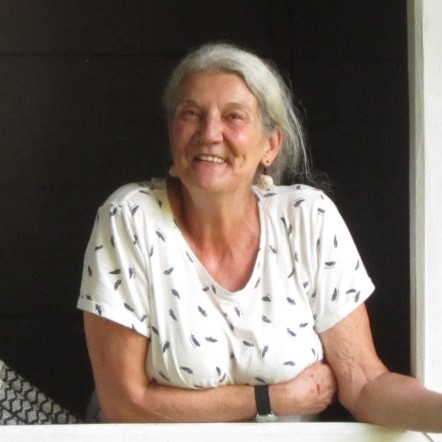 Dominique Tilkin Gallois is a Senior Collaborating Professor at the Department of Anthropology at the University of São Paulo and a researcher at the Center for Amerindian Studies - CEstA. He has experience in Indigenous Ethnology and History, working mainly on the following topics: oral traditions and Amerindian cosmologies, indigenous policies, cultural heritage and traditional knowledge. Develops direct advisory activities to indigenous communities in Amapá and northern Pará, collaborating with public bodies and non-governmental organizations in indigenous training programs.
Dominique Tilkin Gallois is a Senior Collaborating Professor at the Department of Anthropology at the University of São Paulo and a researcher at the Center for Amerindian Studies - CEstA. He has experience in Indigenous Ethnology and History, working mainly on the following topics: oral traditions and Amerindian cosmologies, indigenous policies, cultural heritage and traditional knowledge. Develops direct advisory activities to indigenous communities in Amapá and northern Pará, collaborating with public bodies and non-governmental organizations in indigenous training programs. Faye Ginsburg is David B. Kriser Professor of Anthropology at New York University and founded and directed the Center for Media, Culture and History since its creation in 1993. She has devoted herself for years to the study of images produced by different native groups, bringing to light many intercultural issues involved in Indigenous media production. Her research includes ethnographic film; media ethnography; indigenous media; Disability Studies, and the politics of reproduction among others.
Faye Ginsburg is David B. Kriser Professor of Anthropology at New York University and founded and directed the Center for Media, Culture and History since its creation in 1993. She has devoted herself for years to the study of images produced by different native groups, bringing to light many intercultural issues involved in Indigenous media production. Her research includes ethnographic film; media ethnography; indigenous media; Disability Studies, and the politics of reproduction among others.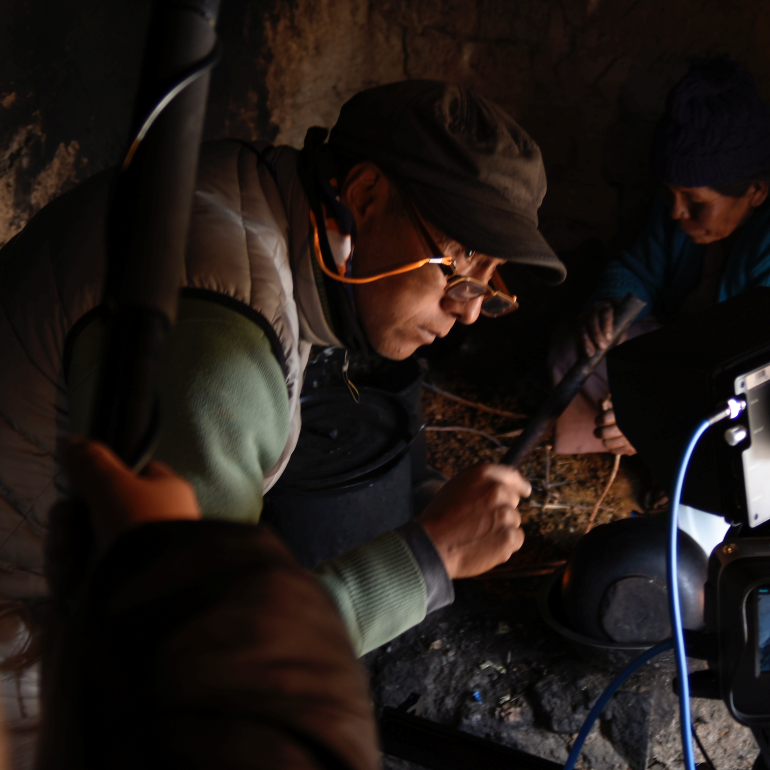 Ivan Molina Velasquez is originally from the Quechua nation. He studied sociology in La Paz and film at EICTV in Cuba. She has made dozens of documentaries since 1989, covering themes in defense of the human rights of young people, women, indigenous peoples and indigenous nations; is an active member of the La Paz Film School, documentaries. She is dedicated to training in cinema and audiovisual, based on a methodology of decolonization and combating hegemonic languages. Founder and active member of ASCURI (Cultural Association of Indigenous Filmmakers) of Brazil.
Ivan Molina Velasquez is originally from the Quechua nation. He studied sociology in La Paz and film at EICTV in Cuba. She has made dozens of documentaries since 1989, covering themes in defense of the human rights of young people, women, indigenous peoples and indigenous nations; is an active member of the La Paz Film School, documentaries. She is dedicated to training in cinema and audiovisual, based on a methodology of decolonization and combating hegemonic languages. Founder and active member of ASCURI (Cultural Association of Indigenous Filmmakers) of Brazil. 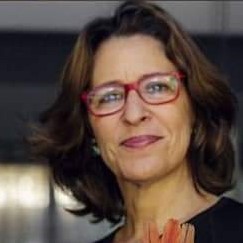 Mari Corrêa is a filmmaker and coordinator of Instituto Catitu, founded in 2009. In addition to being an editor and director, she provides audiovisual training for indigenous peoples. Several of his films have received awards in collaboration with different indigenous groups.
Mari Corrêa is a filmmaker and coordinator of Instituto Catitu, founded in 2009. In addition to being an editor and director, she provides audiovisual training for indigenous peoples. Several of his films have received awards in collaboration with different indigenous groups.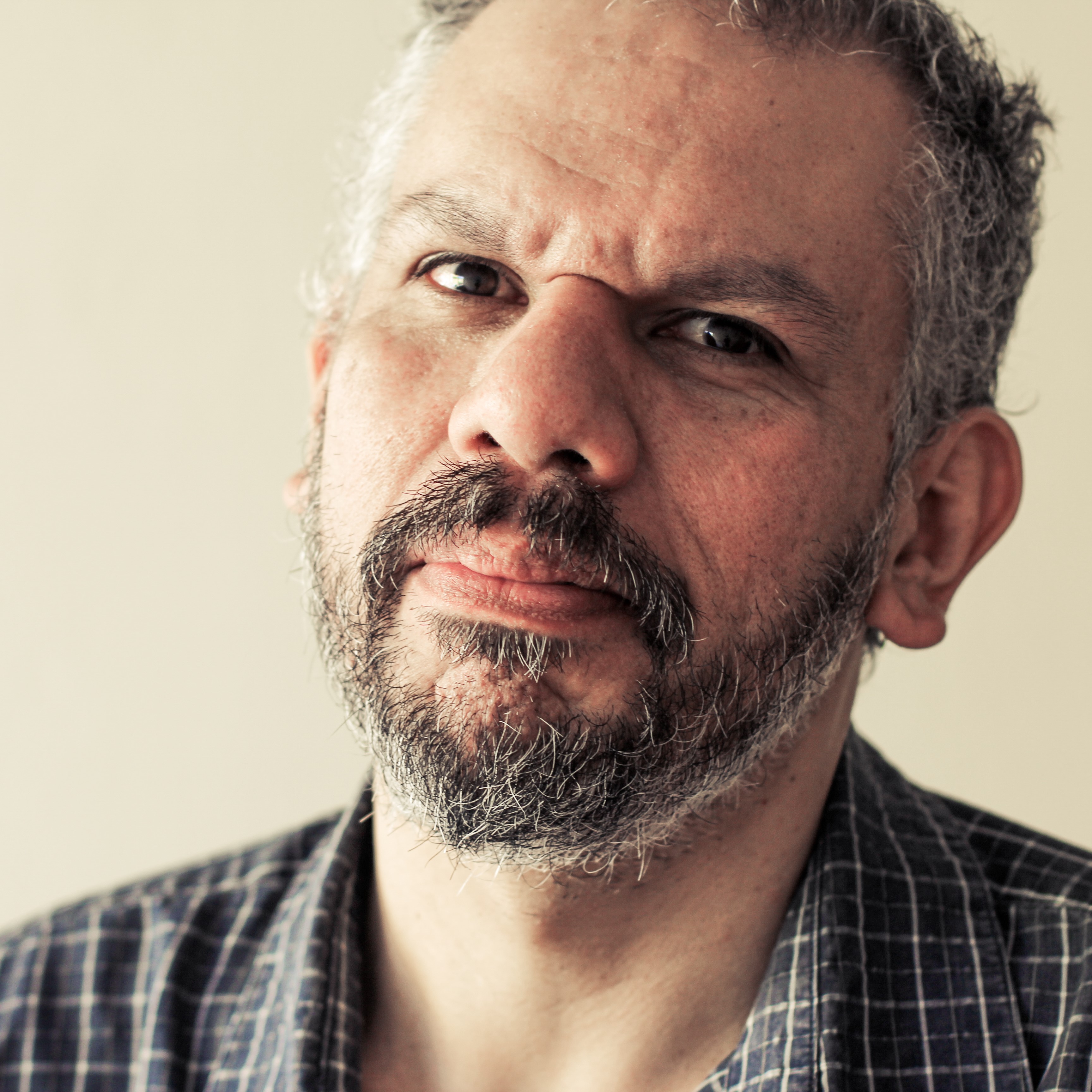 Mauricio Godoy Paredes is Professor, researcher at the Academic Department of Communication (PUCP), Master in Visual Anthropology (MAV), member of the Research Group in Visual Anthropology – (GIAV) and filmmaker. Worked in interdisciplinary and collaborative contexts, integrating areas of audiovisual, anthropology and performing arts. His research revolves around themes such as postmodern cinema, audiovisual archives, memory and political violence in Latin American cinema. He published the first book on the Peruvian documentary “180º gira mi camara”. He was director of the TransLab laboratory, a member of the Docuperu Association, and has participated in the production of academic seminars and training workshops. He is currently pursuing a doctorate in anthropology and is in pre-production of his third feature film “Buenos días, wiracochas”.
Mauricio Godoy Paredes is Professor, researcher at the Academic Department of Communication (PUCP), Master in Visual Anthropology (MAV), member of the Research Group in Visual Anthropology – (GIAV) and filmmaker. Worked in interdisciplinary and collaborative contexts, integrating areas of audiovisual, anthropology and performing arts. His research revolves around themes such as postmodern cinema, audiovisual archives, memory and political violence in Latin American cinema. He published the first book on the Peruvian documentary “180º gira mi camara”. He was director of the TransLab laboratory, a member of the Docuperu Association, and has participated in the production of academic seminars and training workshops. He is currently pursuing a doctorate in anthropology and is in pre-production of his third feature film “Buenos días, wiracochas”.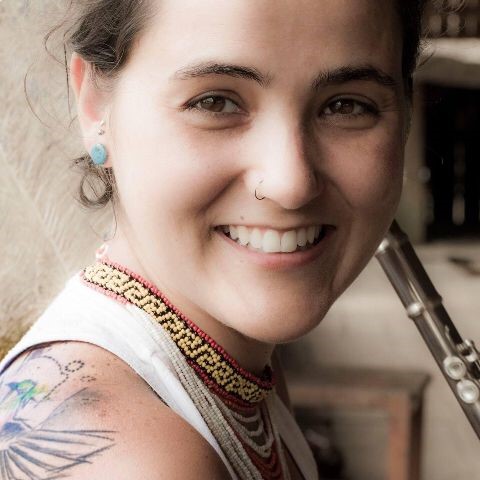 Nadja Marin is an anthropologist and documentarian. PhD in Social Anthropology from FFLCH-USP (2017) and Master of Arts (Master of Arts) from the University of Manchester (2008). Researcher at USP's Visual Anthropology Group with experience in filmmaking and audiovisual teaching with diverse indigenous communities. Co-producer of the video game Huni Kuin: Beya Xina Bena (New Times).
Nadja Marin is an anthropologist and documentarian. PhD in Social Anthropology from FFLCH-USP (2017) and Master of Arts (Master of Arts) from the University of Manchester (2008). Researcher at USP's Visual Anthropology Group with experience in filmmaking and audiovisual teaching with diverse indigenous communities. Co-producer of the video game Huni Kuin: Beya Xina Bena (New Times).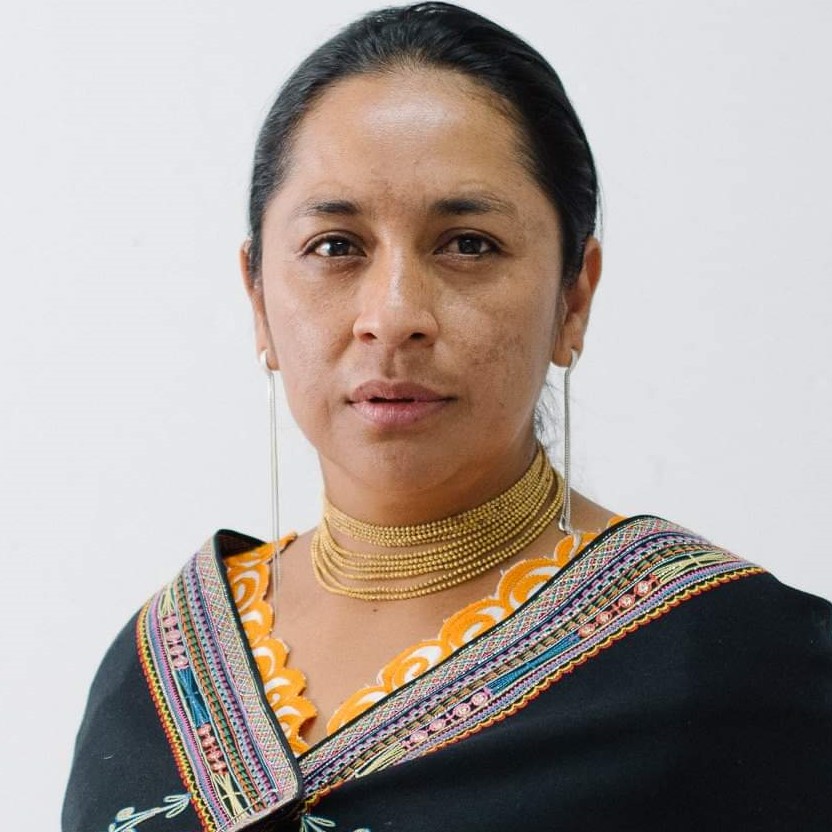 Patricia Yallico Y. is a communicator, trainer, cultural manager and filmmaker. He was born in Guaranda, a small town in the Ecuadorian Andean region. It belongs to the Waranka people of the Quechua ethnic group. Patricia studied Audiovisual Art direction at the National University of the Center of the Province of Buenos Aires (UNICEN), Argentina and obtained the title of Production and Technological Performance at the Institute of Cinema and Performance (INCINE), Ecuador. She is a member of the Ecuadorian indigenous movement, Confederation of Peoples of the Kichwa Nationality of Ecuador (ECUARUNARI), is part of the Corporation of Audiovisual Producers of the Nationalities and Peoples of Ecuador (CORPANP) and is currently on the board of the Association of Cinema and Audiovisual Creators of Peoples and Nationalities (ACAPANA). He directed, produced and wrote several fictional, documentary and experimental cinematographic works.
Patricia Yallico Y. is a communicator, trainer, cultural manager and filmmaker. He was born in Guaranda, a small town in the Ecuadorian Andean region. It belongs to the Waranka people of the Quechua ethnic group. Patricia studied Audiovisual Art direction at the National University of the Center of the Province of Buenos Aires (UNICEN), Argentina and obtained the title of Production and Technological Performance at the Institute of Cinema and Performance (INCINE), Ecuador. She is a member of the Ecuadorian indigenous movement, Confederation of Peoples of the Kichwa Nationality of Ecuador (ECUARUNARI), is part of the Corporation of Audiovisual Producers of the Nationalities and Peoples of Ecuador (CORPANP) and is currently on the board of the Association of Cinema and Audiovisual Creators of Peoples and Nationalities (ACAPANA). He directed, produced and wrote several fictional, documentary and experimental cinematographic works. 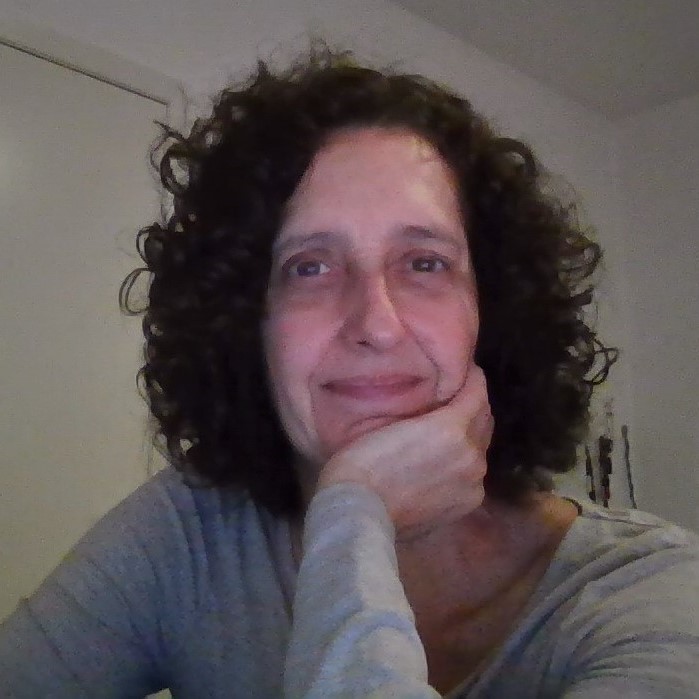 Paula Morgado holds a Masters and PhD in Anthropology from the University of São Paulo. He is a documentalist at the Department of Image and Sound in Anthropology Laboratory. of Anthropology at the University of São Paulo, where she is the curator of audiovisual collections and organization of events and seminars. She is a member of the Visual Anthropology Group and editorial coordinator of GIS - Gesto, Imagem, Som. Revista de Antropologia, from the same institution. His most recent research addresses the following aspects of indigenous societies: self-representation, internet, cinema and photography.
Paula Morgado holds a Masters and PhD in Anthropology from the University of São Paulo. He is a documentalist at the Department of Image and Sound in Anthropology Laboratory. of Anthropology at the University of São Paulo, where she is the curator of audiovisual collections and organization of events and seminars. She is a member of the Visual Anthropology Group and editorial coordinator of GIS - Gesto, Imagem, Som. Revista de Antropologia, from the same institution. His most recent research addresses the following aspects of indigenous societies: self-representation, internet, cinema and photography.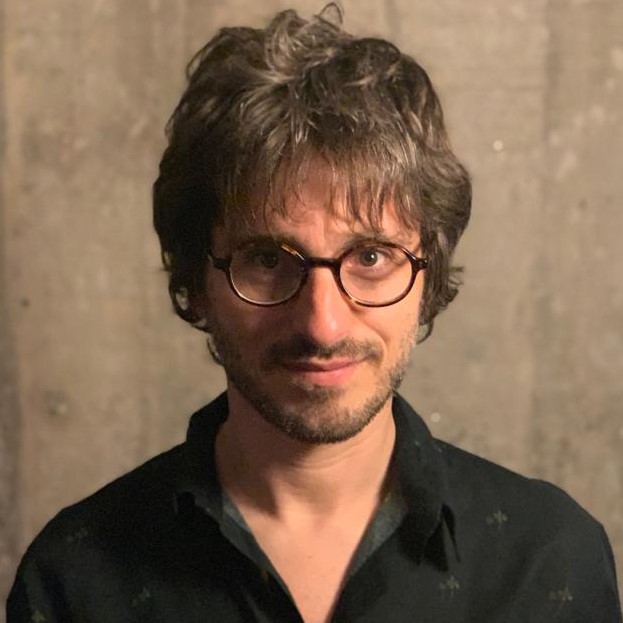 Renato Sztutman is Professor at the Department of Anthropology at USP, current coordinator of the Center for Amerindian Studies - CEstA/USP. Master (2000) and Doctor (2005) in Social Anthropology from the University of São Paulo. He is a researcher at the Visual Anthropology Group (GRAVI) and author of the book The prophet and the principal: Amerindian political action and its characters (Edusp, FAPESP, 2012).
Renato Sztutman is Professor at the Department of Anthropology at USP, current coordinator of the Center for Amerindian Studies - CEstA/USP. Master (2000) and Doctor (2005) in Social Anthropology from the University of São Paulo. He is a researcher at the Visual Anthropology Group (GRAVI) and author of the book The prophet and the principal: Amerindian political action and its characters (Edusp, FAPESP, 2012).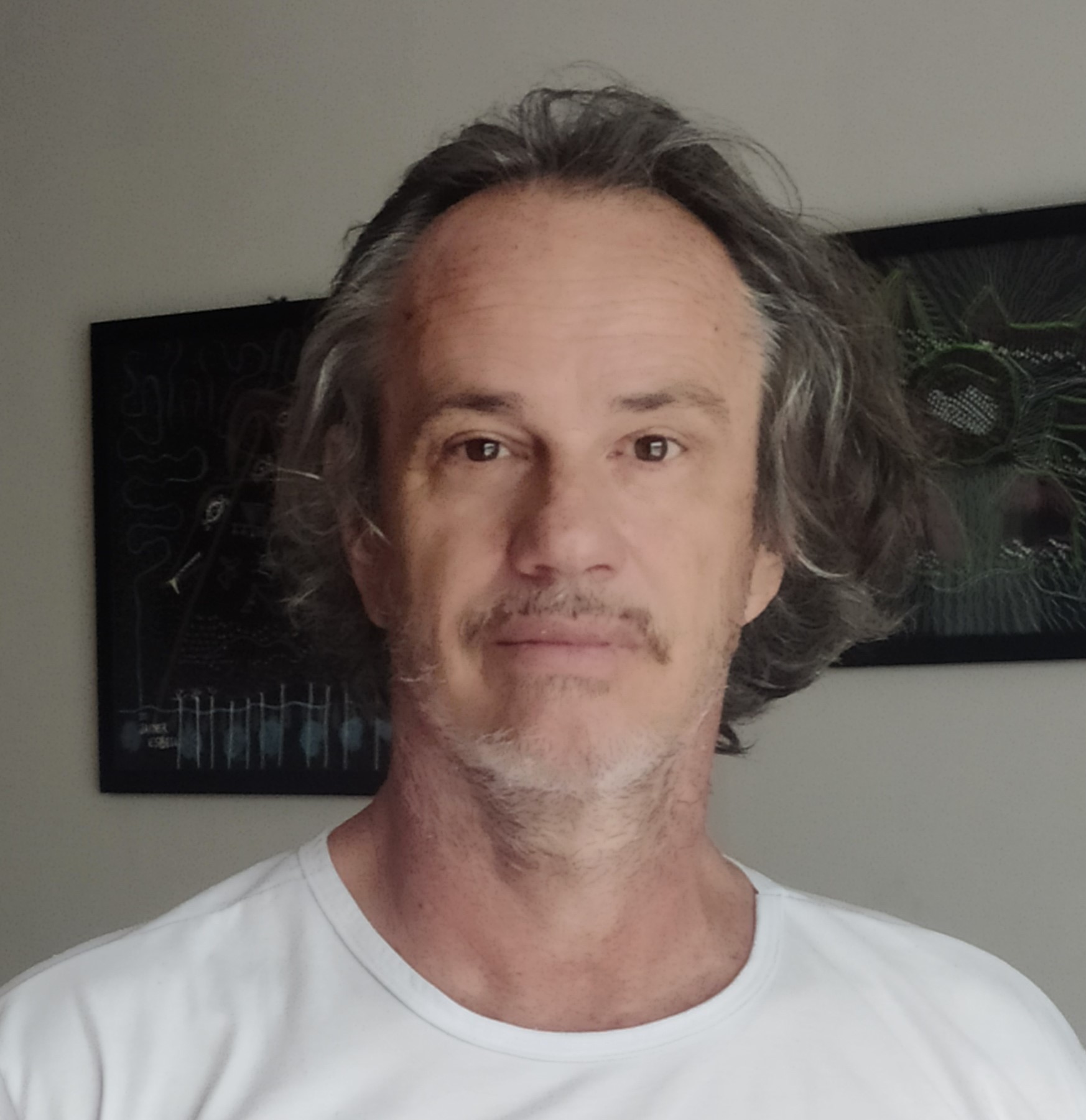 Ruben Caixeta is Full Professor of anthropology at UFMG. He has a master's degree in Social Anthropology from UNICAMP (1991) and a doctorate in Letters and Human Sciences from the University Paris-Ouest Nanterre la Défense (1998). Co-founder and co-organizer of Forumdoc (Belo Horizonte Documentary and Ethnographic Film Festival), an event held annually since 1997. He has been researching the Waiwai people (a Guyanese Karib group) since 1994. His main research and research themes publications are: ethnographic film, collaborative cinema, indigenous cinema and ethnology in the Amazon.
Ruben Caixeta is Full Professor of anthropology at UFMG. He has a master's degree in Social Anthropology from UNICAMP (1991) and a doctorate in Letters and Human Sciences from the University Paris-Ouest Nanterre la Défense (1998). Co-founder and co-organizer of Forumdoc (Belo Horizonte Documentary and Ethnographic Film Festival), an event held annually since 1997. He has been researching the Waiwai people (a Guyanese Karib group) since 1994. His main research and research themes publications are: ethnographic film, collaborative cinema, indigenous cinema and ethnology in the Amazon.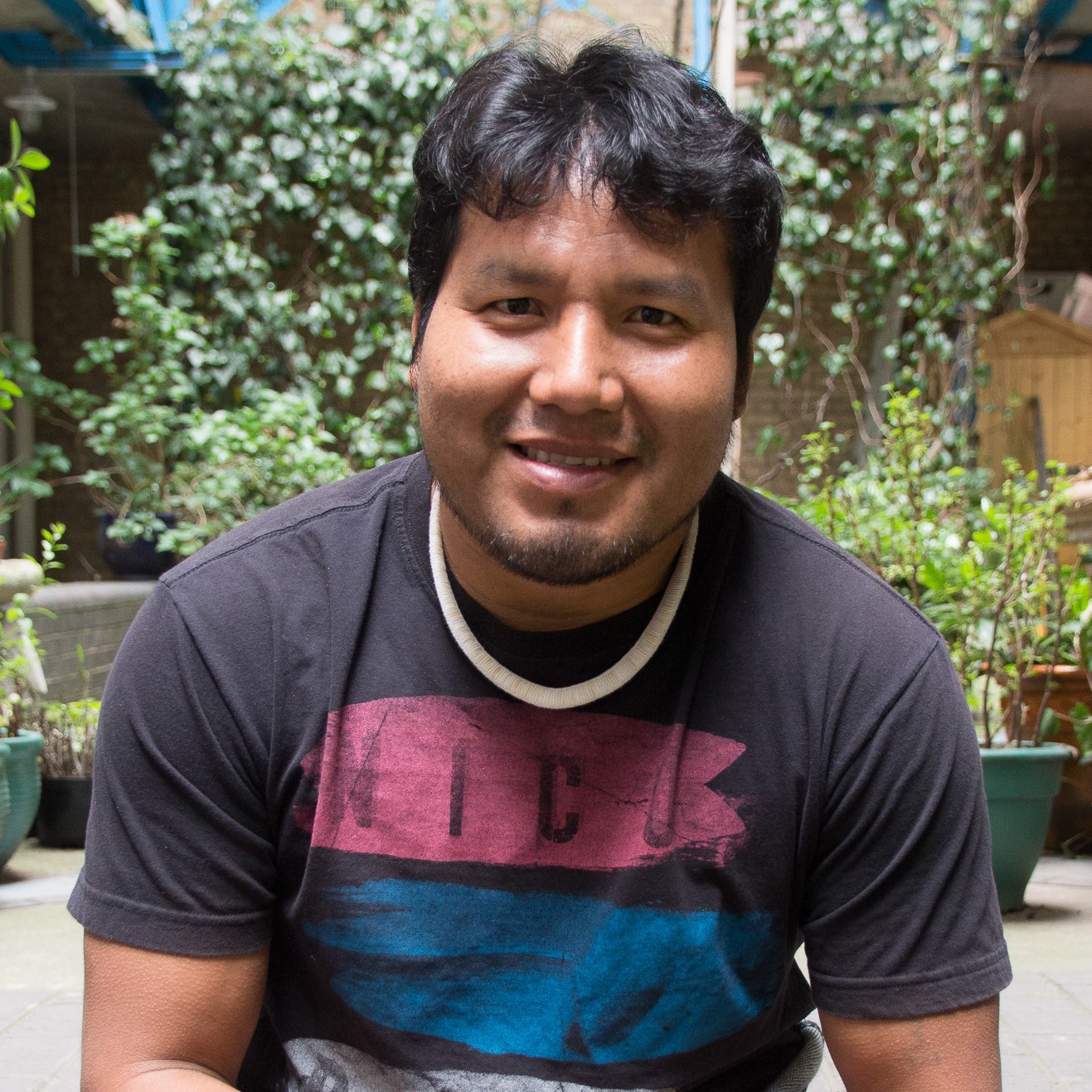 Takumã Kuikuro is a filmmaker, a member of the Kuikuro indigenous village and currently lives in the Ipatse alley, in the Xingu Indigenous Park. Directed the documentary As hiper Mulheres (2011); His films have already won awards at the Brasília Film Festival, at the Présence Autochtone de Terres in Vues, in Montréal (2017), an honorary Scholarship from the Queen Mary University London and was the first indigenous judge at the Brasília Brazilian Film Festival. It is part of the Kuikuro Film Collective, created in 2002.
Takumã Kuikuro is a filmmaker, a member of the Kuikuro indigenous village and currently lives in the Ipatse alley, in the Xingu Indigenous Park. Directed the documentary As hiper Mulheres (2011); His films have already won awards at the Brasília Film Festival, at the Présence Autochtone de Terres in Vues, in Montréal (2017), an honorary Scholarship from the Queen Mary University London and was the first indigenous judge at the Brasília Brazilian Film Festival. It is part of the Kuikuro Film Collective, created in 2002.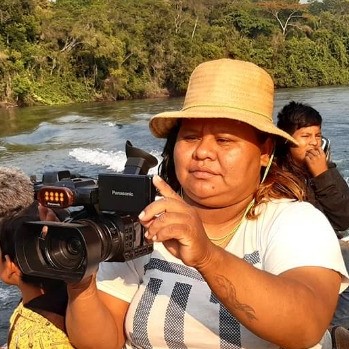 Tipuici Manoki lives in the village of Treze de Maio, on T.I. Irantxe, in Brasnorte-MT. Graduated in Social Sciences at UFMT and currently studying for a Masters in Social Anthropology at the University of São Paulo. Her research, since graduation, is about the importance of women in the political and ritual process of the Manoki people. He started working on filming in 2009 and because of his studies he stopped for a few years, returning to production in 2019. He created the collective Ijã Mytyli by Cine Manoki and Myky, with the support of which he directed and produced two documentaries.
Tipuici Manoki lives in the village of Treze de Maio, on T.I. Irantxe, in Brasnorte-MT. Graduated in Social Sciences at UFMT and currently studying for a Masters in Social Anthropology at the University of São Paulo. Her research, since graduation, is about the importance of women in the political and ritual process of the Manoki people. He started working on filming in 2009 and because of his studies he stopped for a few years, returning to production in 2019. He created the collective Ijã Mytyli by Cine Manoki and Myky, with the support of which he directed and produced two documentaries.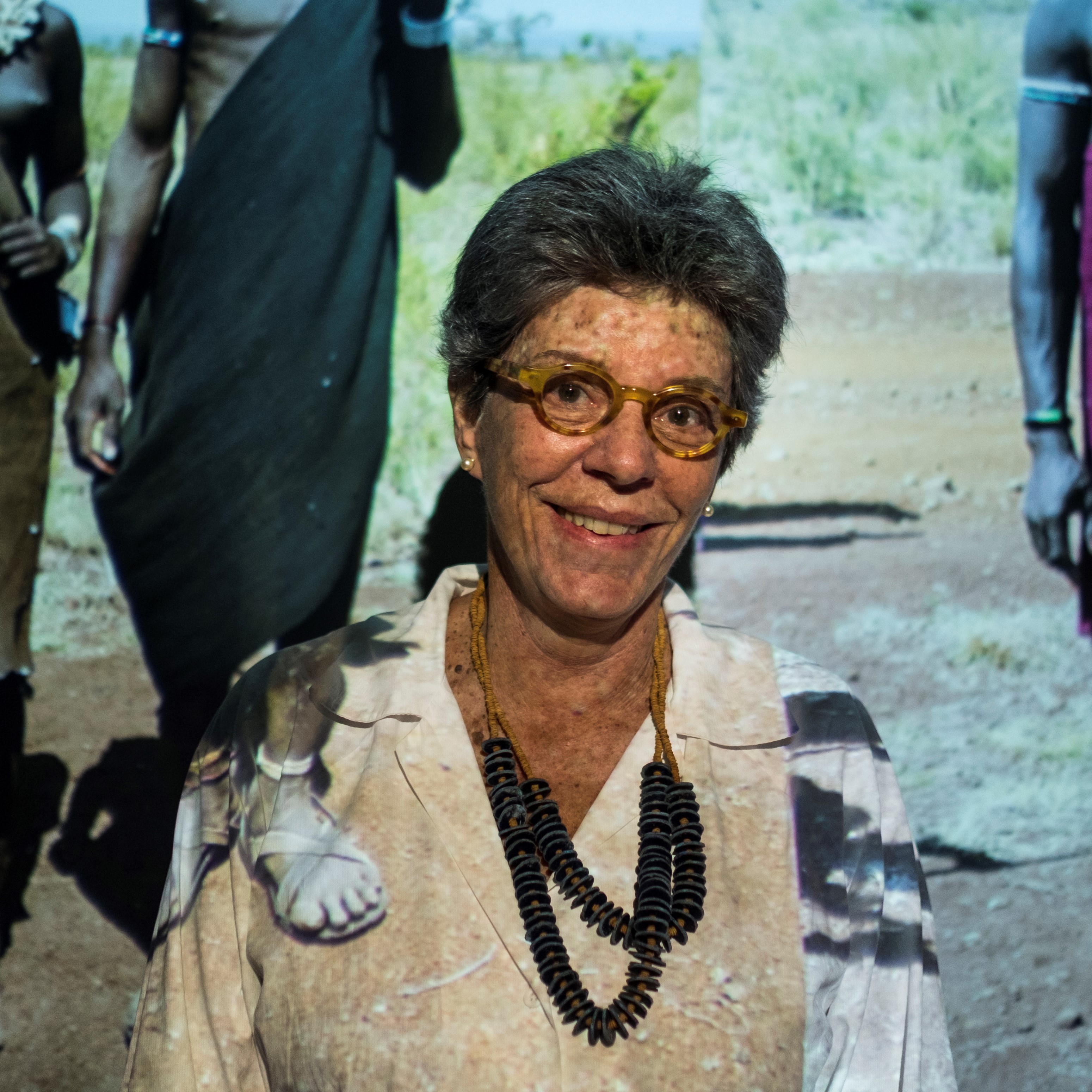 Sylvia Caiuby Novaes is Full Professor at the Department of Anthropology at the University of São Paulo, where she coordinates LISA - Laboratory of Image and Sound in Anthropology and GRAVI - Visual Anthropology Group. She is a researcher at CEstA – Center for Amerindian Studies and editor in charge of GIS – Gesto Imagem e Som, Revista de Antropologia. He coordinated three thematic projects financed by FAPESP and has a fourth project in effect: Photographs and Trajectories. His interests focus on ethnology and visual anthropology, with an emphasis on photography from an anthropological perspective.
Sylvia Caiuby Novaes is Full Professor at the Department of Anthropology at the University of São Paulo, where she coordinates LISA - Laboratory of Image and Sound in Anthropology and GRAVI - Visual Anthropology Group. She is a researcher at CEstA – Center for Amerindian Studies and editor in charge of GIS – Gesto Imagem e Som, Revista de Antropologia. He coordinated three thematic projects financed by FAPESP and has a fourth project in effect: Photographs and Trajectories. His interests focus on ethnology and visual anthropology, with an emphasis on photography from an anthropological perspective.Technical Data
Realization
GRAVI – Visual Anthropology Group (USP)
Production
LISA - Laboratory of Image and Sound in Anthropology (Laboratório de Imagem e Som em Antropologia) (USP)
Department of Anthropology
Support
PRCEU - Pr´-Reitoria de Cultura e Extensão Universitária da USP
Informatics Technical Section/FFLCH (USP)
Audiovisual Sector/FFLCH (USP)
Team
Curationship
Ana Lúcia Ferraz (UFF, GRAVI)
André Lopes (PPGAS, GRAVI/USP)
Paula Morgado (LISA/GRAVI)
Production
Isabel Wittmann (PPGAS)
Paula Morgado (LISA)
Ricardo Dionisio Fernandes (LISA)
Disclosure
Maria Luiza Mahara (PUB Scholarship)
Acknowledgments
ACAPANA - Asociación de Creadores del Cine y el Audiovisual de Pueblos y Nacionalidades
ASCURI - Associação Cultural de Realizadores Indígenas
CLACPI - Coordinadora Latinoamericana de Cine y Comunicación de los Pueblos Indígenas
CEFREC - Centro de Formación y Realisación Cinematográfica
Escuela de Cine Amazônico
Imolivis
Instituto Catitu
Sacha Manchi
Bideo nas Aldeias
In particular:
Cesar Ivan Sanjinés Saavedra
David Hernández Palmar
Fernando Valdívia
Ivan Molina
Simone Giovine Mingugu
And to all directors.
The Center for Studies on Social Markers of Difference (NUMAS/USP) presents:
From the struggle for rights to everyday agencies: LGBTQIA+ subjects in South Africa and Brazil
Silvia Aguião (AFRO/CEBRAP and CLAM/UERJ)
Susan Holland-Muter (University of the Western Cape)
Debate: Suely Messeder (UNEB)
Mediation: Alessandra Tavares (PPGAS/USP)
Translation: Phillip Leite and Thais Tiriba (PPGAS/USP)
Friday, October 8th, 2021
10am (Brasília)
3pm (South Africa)
Subscription Link: https://us06web.
ORGANIZATION: Thais Tiriba (PPGAS/USP) and Laura Moutinho (PPGAS/USP)
PRODUCTION: Carolina Parreiras (NUMAS/USP) and Milena Mateuzi (PPGAS/USP)
SUPPORT: African Studies Committee - Brazilian Association of Anthropology (CEA-ABA)
Building spaces of belonging: queer lesbians in Cape Town
Susan Holland-Muter
Abstract: Two dominant and contrasting narratives characterize public discourse on queer sexualities in Cape Town. On the one hand, the city is considered the gay capital of South Africa, a place that promises opportunities, well-being and belonging. Cape Town, on the other hand, is also known for being a city of strong racialized contrasts, with queer experience materialized in places of racialized (in)security, zones of pleasure and danger in a bifurcated lens of rich zones/township, safety and danger . This presentation will explore narratives of the everyday lives of queer women and lesbians in Cape Town. Interviews with lesbians from my doctoral study will be explored through their counter-narratives, which reveal how they actively "make" Cape Town a home from within and in relation to racialized and class heteronormativities. Navigating Cape Town's everyday/night space reveals the specific and focused lesbian way of occupying and inhabiting the city. Their queer lifeworlds overlap, complement and contradict the city's official 'Pink Maps' and rework the meaning of the representation of Cape Town as the gay capital of South Africa. These gray out the racialized binary of security and territorial danger and produce moods of lesbian home constructions, notably embodied lesbian modes; homonormativity and borders. These counter-narratives reveal queer lesbian lifeworlds that are ephemeral, contingent and fractured, making known hybrid, contrasting, and alternative narratives of the city.
Susan Holland-Muter holds a Ph.D. in Humanities from the Department of Sociology at the University of Cape Town in South Africa. She has been actively participating in social movements of women and LGBTI people in South Africa and Colombia, and working as a researcher, teacher and public policy advocate in the areas of gender and sexuality policies. Her publications include a focus on lesbian motherhood, families and queer kinship, as well as the politics of lesbian spatialities in everyday life. She is the author of Outside of the Safety Zone: An agenda for research on violence against lesbian and gender non-conforming women in South Africa. He currently teaches in the Department of Sociology at the University of the Western Cape.
Notes on a trajectory of research on sexuality, gender, race and government policy in Brazil
Silvia Aguião
Abstract: The presentation exposes some ethnographic elements of research carried out between 2003 and 2016, regarding the constitution of the field of “LGBT” rights and the “promotion of gender and race equality” at the Brazilian government level. The objective is to reflect on the relationship between the research questions, the sociopolitical context of the period and the theoretical-methodological perspectives adopted in the investigations.
Silvia Aguião holds a Ph.D. in Social Sciences from the State University of Campinas, a Masters in Public Health from the Institute of Social Medicine/UERJ and a degree in Social Sciences from the State University of Rio de Janeiro. Performed post-doctoral internships at the Brazilian Center for Analysis and Planning (CEBRAP) and at the Graduate Program in Psychology at the Federal University of Maranhão (PPGPI/UFMA). She is currently a research associate at AFRO - Center for Research and Training in Race, Gender and Racial Justice (AFRO/CEBRAP) and at the Latin American Center for Sexuality and Human Rights (CLAM/UERJ). It operates and conducts research in the areas of sexuality, gender and race in its interfaces with sociability, policies and rights, social movements and State processes. She is the editor of Sexualidad, Salud y Sociedad - Revista Latinoamericana and author of the book Doing yourself in the State. An ethnography on the process of constitution of the 'LGBT' as subjects of rights in contemporary Brazil (Eduerj, 2018).
Suely Messeder - debater
Suely Messeder has a degree in Social Sciences from the Federal University of Bahia (UFBA), a Masters degree from the Postgraduate Program in Social Sciences at UFBA and a Ph.D. in Anthropology from the University Santiago de Compostela, validated in Brazil by the Postgraduate Program in Anthropology - UFBA She is a full professor at the University of the State of Bahia - UNEB. She was coordinator of the Multi-institutional and Multidisciplinary Doctorate in Dissemination of Knowledge and permanent professor of the Graduate Program in Cultural Criticism at Campus II - Alagoinhas. She is the coordinator of the Enlace Research Group and was the first secretariat of the ABEH (Brazilian Association of Homoculture Studies) during the 2010-2012 administration. She was manager of the Technical Cooperation Agreement between the Public Ministry and the State University of Bahia. He is currently a member of the Basic Advisory and Technical Assessment Chamber at FAPESB. Her interests in teaching, research and extension are in the areas of sexualities, masculinities, gender relations, body, ethnic-racial relations, knowledge management and dissemination, social entrepreneurship, social technology and Bahia.
Schedule 09/30
From 10:00am to 12:00pm
Opening: Laura Moutinho (PPGA/USP)
Ana Paula Hey (PPGS/USP)
Opening table
Coordination: Jacqueline Moraes Teixeira (CEM/ COPAF/ NUMAS/ USP)
Amanda Amparo (PPGAS/COPAF/USP)
Marcia Lima (PPGS/USP)
Antônio Sérgio Guimarães (PPGS/ USP)
Link: https://www.youtube.com/watch?v=s10a0068yWQ
From 14:30 to 16:30
Table 1: Indigenous peoples in graduate school
Coordination: Diego Madi Dias (School of Public Health/ USP)
Fabiane Medina da Cruz (UNICAMP)
Talita Lazarin DalBo (Intervillages Committee)
Emerson Oliveira (PPGAS/ USP)
Debater: Wanda Ortega Witoto (MEIAM/ UEA - Parque das Tribos/ Manaus)
Link: https://www.youtube.com/watch?v=LxNCa5ioCAg
From 6:00 pm to 8:00 pm
Table 2: Trans people in affirmative action policies in graduate school
Coordination: Silvana Nascimento (PPGAS/ USP)
Brume December Iazetti (Erasmus Mundus Joint Masters)
Sayonara Nogueira (Director - IBTE)
Debater: Gabrielle Weber (Environmental Engineering/ USP)
Link: https://www.youtube.com/watch?v=h3c8EQPhQ8Y
Schedule 10/01
From 10:00 am to 12:30 pm
Table 3: Race relations in the field of affirmative action
Coordination: Juliana Costa (USP/ Women)
Andrea Lopes
Regimeire Maciel (UFABC)
Anna Venturini (Cebrap/USP)
Debater: Jocélio Santos (UFBA)
Link: https://www.youtube.com/watch?v=PeqwZxVI-5M
From 14:30 to 16:00
Table 4: People with disabilities in affirmative action policies in graduate studies
Coordination: Shirley Silva (FE/ USP)
Valeria Aydos (UFRGS)
Anahi Guedes de Mello (UFSC/ Anis-Institute of Bioethics)
Luciana Viégas (Black Lives with Disabilities Matter/ Autism Magazine)
Debater: Pedro Lopes (City School and NUMAS/ USP)
Link: https://www.youtube.com/watch?v=9onJQYyaThY
From 5:00 pm to 7:00 pm
Table 5: Heteroclassification Commissions: Research and Experiences
Coordination: Adriana Alves (Institute of Geosciences/ USP)
Ana Paula Miranda (UFF)
Rodrigo Ednilson (UFMG)
Paulo Neves (UFABC)
Debater: Acácio Almeida (UFABC)
Live release of Volume 6 of GIS - Gesto, Imagem e Som - Revista de Antropologia with the participation of the volume's editor, Francirosy Barbosa, the organizers of the Musicar Local dossier, Erica Giesbrecht, Rose Satiko Hijiki and Vi Grunvald, and the authors Suzel Ana Reily (Unicamp) and Jean dos Anjos (LAI/UFC).
Live broadcast:https://youtu.be/
Volume 6 of GIS has articles, essays, translations, reviews, in addition to the In Memoriam and Achados na Rede section.
Contributed in vol. 6: Alexsânder Nakaóka Elias, Alice Nin, Alice Villela, Amanda Ravetz, Ana Carolina Brindarolli, Anna Flávia Guimarães Hartmann, Anna Grimshaw, Andre Castro Soares, André GoldFeder, Arthur Silva Barbosa, Brenno Brandalise Demarchi, Clarice E. Peixoto, Cristina de Branco , Ellis Regina Sanchez Hermoza, Érica Giesbrecht, Felipe Neis Araujo, Fernando de Tacca, Gibran Teixeira Braga, Jaqueline Gomes, Jean Souza dos Anjos, Julia Couto Mota, Juan Pablo Estupiñán, Kelen Pessuto, Luís Felipe Hirano, Luiz Ricardo Basso Ballestero, Luiz Henrique Campos Pereira, Luiza Fernandes Coelho, Marcelo Artioli Schellini, María Eugenia Domínguez, Mariana Santos Teófilo, Meno Del Picchia, Michael Taussig, Noelle Rodrigues Ventura, Paula Pagliari de Braud, Raquel Mendonça Martins, Renan Moretti Bertho, Riccardo Putti, Roderick Peter Steel , Rogério Gonçalves de Carvalho, Rose Satiko Gitirana Hikiji, Soraya Fleischer, Silvia Citro, Suzel Ana Reily, Sylvia Caiuby Novaes, Tatiana Lotierzo, Tayná Corrêa de Sá, Vi Grunvald.
We invite you to browse the magazine's summary to access the items that interest you. Access https://www.revistas.usp.br/gis


